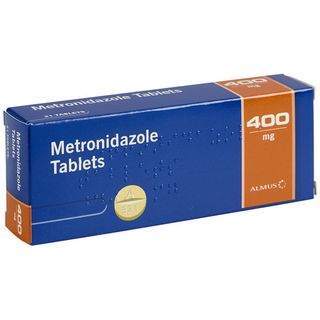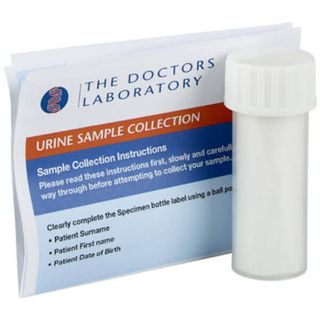
Trichomoniasis
Sexual health is incredibly important, no matter your age or orientation. Knowing the warning signs for sexually transmitted infections (STIs) like trichomoniasis can help to ensure you get prompt treatment and don’t give the infection to anyone else. Also known as trichomonas or simply ‘trich’, trichomoniasis is a non-viral STI that’s caused by a parasite. Currently on the rise in the UK, it can cause an unusual discharge from the genitals and make it painful to urinate or have sex. Like most STIs, it’s transmitted through unprotected sex, so using a condom will help to stop the spread and keep you healthy.
Trichomoniasis Treatments
 Metronidazole 400mg Tablets For Trichomoniasis£17.99
Metronidazole 400mg Tablets For Trichomoniasis£17.99
Trichomoniasis Test Kit
Trichomoniasis Test Kit£39.99
Start your assessment for Trichomoniasis
Don't wait to get the medical help you need.
Once you complete a short online assessment about your condition, you will be able to select your preferred treatment and quantity from a list of appropriate options for you.
- Reviewed by our UK-based medical team
- Takes less than 3 minutes to complete
- Approved treatments dispatched same day (before 3pm)
Ordering as easy as 1, 2, 3
1. Find the ideal treatment
2. Get a free consultation
3. Enjoy speedy delivery
Advice for Trichomoniasis
What is Trichomoniasis?
Trichomoniasis is a lesser-known STI which causes symptoms such as genital discharge, pain when peeing, and soreness around the genitals. It is more common in women than men, and many people will have the condition without realising it — as not all sufferers of trich show symptoms.
It is caused by a parasite known as Trichomonas vaginalis, and is most often contracted through having unprotected sex with someone who already has the infection. It can also be passed on through the sharing of unwashed sex toys. If symptoms do appear, they’ll typically develop within a month of you becoming infected.
If you’ve been diagnosed with trich, you can purchase a course of antibiotics from The Independent Pharmacy after completing a short health questionnaire. Your treatment will be delivered in discreet packaging as soon as the next working day.
What causes Trichomoniasis?
Trichomoniasis is caused by a single-cell parasite called Trichomonas vaginalis, which is spread from one person to another through unprotected sexual intercourse or the sharing of sex toys. However, it is not thought to spread through oral sex, anal sex, or through using the same toilet seat.
Anyone who is sexually active can get trich, although women are considered to be at higher risk than men. The primary risk factors include:
- Having unprotected sex (either penis-to-vagina or vagina-to-vagina)
- Having several sexual partners
- Having a history of other STIs
- Having a partner who has tested positive for trich
What are the symptoms of Trichomoniasis?
Trichomoniasis symptoms typically develop within a month of contracting the infection, although many people who have it (particularly men) will not develop any symptoms at all. However, even if you do not experience symptoms, it is still possible to pass the infection on to others.
Trich symptoms present themselves slightly differently in men and women. In women, the infection typically affects the vagina, cervix, or urethra, while men usually get it in their urethra or prostate.
Symptoms of trichomoniasis in women include:
- Abnormal, often foul-smelling vaginal discharge that may be thick, thin, or frothy and clear, white, or yellow-green in colour
- Soreness, redness, and itching around the vagina and occasionally the inner thighs
- Pain or discomfort when urinating or having sex
- Pain and discomfort in the lower stomach
While most men will not experience symptoms, they can include:
- Pain when urinating or during or after ejaculation
- An urge to urinate more frequently than normal
- Soreness, redness, or itching around the head of the penis or foreskin
- Abnormal white discharge from the penis
How is Trichomoniasis diagnosed?
Because it shares similar symptoms with many other sexually transmitted infections (STIs) — Gonorrhoea is also characterised by discharge from the genitals and pain while urinating, for example — trichomoniasis is not always easy to diagnose.
However, trichomoniasis is usually diagnosed by a doctor or sexual health nurse through an examination of the genital area. In women, signs of trich include abnormal, unpleasant-smelling discharge and red blotches on the walls of the vagina and the cervix, while for a man, a GP or nurse will examine the penis for signs of inflammation or discharge.
In some cases, it may be necessary to perform a lab test to accurately diagnose trich. This involves examining a sample of the genital discharge under a microscope to identify signs of infection, or collecting a swab and sending it to a lab for further testing.
If you suspect you may have trichomoniasis or any other STD, you should visit your GP or local sexual clinic. In some cases, your GP might refer you to a genitourinary medicine (GUM) clinic for tests if they suspect you may have trich.
How to treat Trichomoniasis
If you’ve been diagnosed with trichomoniasis, you should get treated as quickly as possible — the infection is unlikely to go away on its own, and you risk passing the infection on to others if you don’t get it treated.
Trichomoniasis treatment usually involves a course of antibiotics. Antibiotics for trichomoniasis include Metronidazole, which is the most common and effective treatment for trich.
Metronidazole can be used to treat a range of infections — such as skin or mouth infections, or conditions such as bacterial vaginosis — but it is also very effective at treating a trich infection. When taken twice a day, Metronidazole will usually clear up the infection within 7 days.
You should follow the dosage as advised by your doctor or pharmacist. It’s most effective when taken after eating, but you should refrain from drinking alcohol while taking Metronidazole and for at least 24 hours after completing the course. You should also avoid having unprotected sex during treatment, as you may become reinfected or continue to pass the infection to others.
You may experience side effects when taking Metronidazole, which can include:
- Nausea and vomiting
- Skin flushing
- An increased heart rate or heart palpitations
If you experience these or any other side effects while taking antibiotics for trichomoniasis, contact your GP or pharmacist for advice.
Can I prevent Trichomoniasis?
As with most sexually transmitted infections (STIs), trich can be prevented by practising safe sex. It’s important to remember that even if you’ve had trichomoniasis and been treated for it, it’s still possible to get the infection again.
The following measures will help prevent you from catching trichomoniasis or any other STI, while they’ll also help prevent you passing it on to a sexual partner:
- Using a condom every time you have sex (remember that oral contraceptives do not provide protection from STIs)
- Avoiding sharing sex toys (if you do, wash them between use or cover them with a fresh condom)
- Practising good hygiene by keeping your genitals clean before and after sex
- Limiting your number of sexual partners
- Routinely getting tested for trich and other STIs
It’s also important to tell your sexual partner(s) if you have trichomoniasis, as this will enable them to treat or prevent the condition.